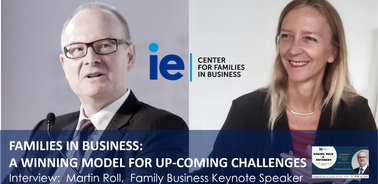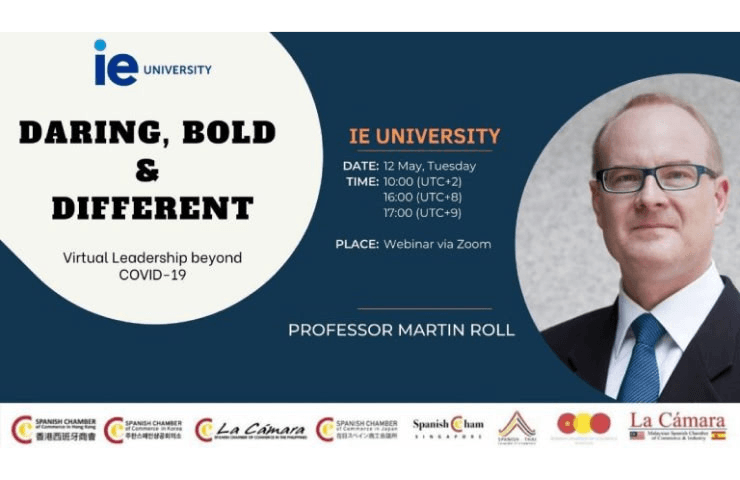Martin Roll on Family Businesses models beyond Covid-19

COVID19 is stressing challenges to leaders but also provide opportunities. Do family businesses and privately-owned corporations react differently from other corporations? Is this crisis confirming the strengths of families as responsible shareholders? Are families businesses an up-coming model in turbulent times?
You can meet our Associate, Professor Martin Roll, in a webinar on “Daring, Bold & Different Leadership beyond COVID19” on May 12. On top of his deep global expertise on strategic leadership, Martin has more than 20 years of experience in dealing with families in business and family offices around the world. We took the chance to get his input from this specific point of view.
Q. Martin, in your webinar you will demonstrate that successful leaders use 6 important strategic skills to lead through turbulent times: Purpose, Resilience, Networks, Long-term lens, Adaptation & Agility, and People & Culture. Those are exactly the strengths of families-owned and family-inspired companies, right?
A. Yes, I believe these 6 essential traits of leadership are often also found in successful family firms. Family firms are special in many distinct ways, and many of them have experienced turbulent times before – and learned from it. That has provided them with a certain level of resilience and longevity. Family owners are personally (and emotionally) involved in the business that may span several generations, and they are driven by purpose in various ways.
To be successful as a family firm, it is important to balance these 6 traits, and between the past, present and the future.
Johan H. Andresen, 5th generation owner and chairman of Ferd from Norway, has expressed what I believe captures it very well: “I have reformulated the traditional idea of the long-term with the idea of ‘we can be impatient for a very long time.”
Q. In the last months we have seen several examples of family leaders totally committed to contribute personally and through the company to help during the pandemic. Is purpose more clearly embedded and actionable in a family-owned company?
A. I believe purpose plays a hugely important role in family firms and often provides an enduring competitive advantage. As owners control the business, they can initiate instant responses during a crisis. They are inclined to contribute due to the social contract that family firms often have locally, regionally and sometimes globally due to legacy and heritage, past important events that helped shape their business journeys, employee affinity and the overall role of the company in society.
Social impact is at the heart of many family businesses, and as an example, global family offices allocate more and more investments into that evolving asset class. The next generation owners in family firms are generally very interested and deeply committed to social impact investing.
Q. Do you believe that the experience of COVID19, accelerating megatrends like technology and social responsibility, will contribute to generational convergence in Family Businesses Governance?
A. Family business governance is a complex topic with many fragmented challenges involved and it is not always easy to get right as every family has to find their own model that suits them well.
Generational convergence and power shifts can be hard to manage as family members often find it hard to step aside and relinquish control to the next generation or to involve/ empower them in the business. The long-term viability of family businesses requires each generation to have high levels of ambition and motivation to drive family unity and a certain level of tolerance and integrity.
I believe, however, that family business governance has evolved very strongly in the last 10 years, and above factors like COVID19 and megatrends will definitely contribute to its momentum.
Q. Do you see differences between world regions on the role and challenges of the Next Gen?
A. Long-term success of family firms is not a given, and it is definitely not an easy task to involve and empower the next generation. There are many complexities involved when ownership, management and family roles tend to overlap, and there are fewer clear distinctions between them.
Succession planning must start early to be successful as it takes time and resources to get it right as every family firm is different. Several aspects are important: Trust, open communication in the family and between generations, the mandate of the next generation, current and future roles and responsibilities, and an evolving plan for the succession itself – to just name a few.
There can be unique geographical and cultural differences on next-generation issues relating to dimensions like authority (from egalitarian to hierarchical) and decision making (top-down to consensual) which all impacts the style of leadership.
For example, communication between generations in Asia is typically less direct as compared to Western cultures. When combined with an inherent respect for seniority, open discussions and potential disagreements tend not to surface so issues can hang in the air for a long time.
In the next 5-10 years, many Asian family firms will have to go through succession but their paths are less clear, despite the fact that the younger generations are getting more outspoken and are demanding clearer answers about the future.
Learn more about Martin Roll: martinroll.com
You might be interested:
Webinar registration here:
